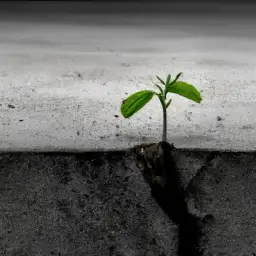Are you facing difficult times and struggling to find a way to overcome adversity? It’s easy to feel overwhelmed and discouraged when life throws us unexpected challenges, but the power of grit can help you push through even the toughest of situations.
In this article, we’ll explore the fundamentals of grit in overcoming adversity and building resilience in difficult times.
Grit is defined as the combination of passion and perseverance towards long-term goals, even in the face of obstacles and setbacks. It’s the ability to keep going when things get tough and to maintain focus on what truly matters.
By cultivating grit, you can develop the resilience needed to overcome adversity and thrive in difficult times. So, whether you’re dealing with a personal crisis, a challenging work situation, or a major life transition, the principles of grit can help you stay strong and keep moving forward.
Key Takeaways
- Developing grit takes time and effort, but it is a vital trait for overcoming adversity and achieving long-term success.
- Social and professional support are crucial in tough times, and building a strong support system is important.
- Practicing self-care and mindfulness techniques can help build resilience and better handle challenges.
- Learning from setbacks and embracing imperfection are important for developing a growth mindset and achieving long-term success.
Understanding the Concept of Grit
Let’s dive into what grit really means and why it’s crucial for overcoming tough times. Grit is a term coined by psychologist Angela Duckworth, which refers to a combination of mindset and perseverance. It’s the ability to stick with challenging tasks and push through obstacles, even when things get tough.
Developing grit takes time and effort, but it’s a vital trait for overcoming adversity and achieving long-term success. Cultivating resilience through challenge and growth is one of the key ways to develop grit. This means intentionally putting yourself in difficult situations and learning from them.
When faced with a challenge, focus on what you can control and take deliberate actions to overcome it. By embracing challenges and viewing them as opportunities for growth, you’ll build resilience and develop a stronger sense of grit.
Remember, grit isn’t about being perfect or never failing, but rather about having the determination to keep pushing forward despite setbacks.
Identifying and Accepting Adversity
Recognizing and embracing tough situations can be the first step towards building an unyielding mindset. Overcoming fear and finding opportunities amidst adversity can help you develop grit, a quality that defines those who persevere through tough times. It’s crucial to identify the challenges in your life, accept them, and take the necessary steps to work through them.
Here are three ways to help you identify and accept adversity:
-
Acknowledge your feelings: When faced with adversity, it’s essential to recognize and validate your emotions. Allow yourself to feel sad, angry, or frustrated. By acknowledging your emotions, you can start to process them and move towards a place of acceptance.
-
Focus on the present: When you dwell on past failures or future uncertainties, it can be challenging to accept the adversity in front of you. Instead, focus on the present and what you can do to overcome the situation. This approach can help you break down the problem into manageable steps and take action.
-
Look for opportunities: Adversity can present opportunities for growth and development. Instead of focusing on the negative aspects of the situation, look for opportunities to learn, grow, and improve. These opportunities can help you build resilience and develop a growth mindset, which is essential for overcoming adversity.
By identifying and accepting adversity, you can start to develop the mindset of a gritty individual. Remember, grit isn’t something you’re born with, but rather a skill that can be developed through practice and perseverance.
Setting Realistic Goals
You can achieve success by setting realistic goals that challenge you without overwhelming you. When you set goals that are too lofty, you may become discouraged and give up. On the other hand, if you set goals that are too easy, you may not push yourself to grow and develop. So, it’s important to find the right balance.
By breaking down barriers and setting achievable goals, you can work towards success step by step. In addition, measuring progress is key to staying motivated and on track. When you see how far you’ve come, it can inspire you to keep going and push yourself even further.
Celebrate your successes along the way, no matter how small they may seem. Remember, every step forward is a step in the right direction. With realistic goals and a way to measure progress, you can overcome adversity and build resilience.
Building a Support System
When building a support system, it’s important to recognize the value of social support from family and friends who can provide emotional encouragement and practical help. Professional support such as therapy or coaching can also be beneficial in navigating challenging situations.
Additionally, having a mentor who can provide guidance and wisdom can be a valuable asset in achieving your goals. It’s important to avoid negative influences that may hinder your progress or discourage you from pursuing your aspirations.
Importance of Social Support
Having a strong support system is crucial in tough times, and you’ll find that having people to lean on can make all the difference.
Here are some ways in which social support can impact your mental health and help you stay resilient in difficult times:
-
Emotional Support: Having someone who you can open up to and share your feelings with can help you feel heard, validated, and supported. This can alleviate feelings of loneliness, isolation, and anxiety.
-
Practical Support: Having people who can help you with tasks such as grocery shopping, childcare, or running errands can help you focus on your own well-being and reduce the burden of stress.
A lack of social support can lead to increased feelings of stress, anxiety, and depression. It’s important to recognize the importance of social support and to actively seek out and nurture relationships with people who can provide it.
Whether it’s family, friends, or a support group, having a network of people who care about you and can help you through tough times is a crucial part of building resilience.
Remember, it’s okay to ask for help and to rely on others for support. In fact, it takes strength and courage to reach out and lean on others when you need it. So don’t hesitate to reach out and build those connections – it could make all the difference in your ability to overcome adversity.
Professional Support and Mentorship
Looking for ways to boost your mental health and career success? Consider seeking out professional support and mentorship!
Finding mentors can provide invaluable guidance and insight into your industry or field of work. A mentor can help you navigate challenges, share their own experiences, and offer advice on how to achieve your goals.
Networking for support is also important in building a strong professional support system. By connecting with colleagues and peers, you can find mentors, gain access to new opportunities, and receive feedback on your work.
Joining professional organizations or attending industry events can help you expand your network and find like-minded individuals who can provide support and guidance.
Remember, having a strong support system can help you overcome obstacles and achieve success in both your personal and professional life.
Avoiding Negative Influences
Now that you’ve learned about the importance of professional support and mentorship in building grit and resilience, it’s time to shift our focus to the negative influences that can hinder your progress.
It’s important to recognize that not everyone in your life will have your best interests at heart, and some individuals may even actively work against you. In order to develop a strong sense of grit, it’s crucial to identify and avoid these negative influences.
First and foremost, surround yourself with positive reinforcement. Seek out friends, family members, and colleagues who support your goals and encourage you to persevere through challenges.
Additionally, it’s important to establish personal boundaries and protect your mental and emotional wellbeing. This may involve distancing yourself from individuals who consistently bring negativity into your life or setting clear limits on the amount of time you spend engaging with toxic individuals.
Remember, building grit requires a strong sense of self-awareness and the ability to prioritize your own needs and goals.
- Seek out positive reinforcement
- Surround yourself with supportive individuals
- Establish personal boundaries
- Distance yourself from negativity
- Prioritize your own needs and goals.
Practicing Self-care
Take some time for yourself and make self-care a priority, so you can better handle any challenges that come your way. It’s important to practice self-reflection techniques to understand your emotions and thoughts. This can include journaling, meditation, or talking to a trusted friend.
By taking the time to reflect on your feelings, you can better understand what you need to do to take care of yourself. In addition to self-reflection techniques, practicing mindfulness can also be helpful for building resilience. Mindfulness practices involve focusing on the present moment and being aware of your thoughts and feelings without judgment.
This can include activities like yoga, deep breathing, or simply taking a walk outside. By practicing mindfulness regularly, you can train your brain to better handle stress and adversity, making it easier to bounce back from difficult times.
Remember, taking care of yourself is not selfish, but rather a necessary step in building resilience.
Learning from Failure and Resilience
Learning from setbacks and developing the ability to bounce back is crucial in developing a growth mindset and achieving long-term success. It’s important to realize that failure is not the end, but rather an opportunity to learn and improve.
Embracing imperfection and accepting that mistakes will happen allows you to move forward and focus on the next steps towards achieving your goals.
In order to develop resilience, it’s important to view challenges as opportunities for growth. Instead of becoming discouraged and giving up, take a step back and assess the situation.
What can you learn from this setback? How can you use this experience to improve your approach moving forward?
By adopting a growth mindset and viewing failure as a necessary step towards success, you can build the resilience needed to overcome adversity and achieve your goals.
Frequently Asked Questions
What are some common misconceptions about the concept of grit?
You may have heard that grit is simply about toughing it out through difficult situations. However, this is just one of the many misconceptions about grit.
In fact, grit is much more than just perseverance. It’s about having a growth mindset and being open to learning and adapting to challenges.
Another misconception is that grit is something you’re born with, and it can’t be developed. But research shows that grit can be learned and developed over time through deliberate practice and effort.
So, don’t let these misconceptions hold you back. Embrace the importance of a growth mindset in developing grit, and you’ll be well on your way to overcoming adversity and building resilience.
How can one distinguish between healthy and unhealthy adversity?
When it comes to adversity, it’s important to differentiate between healthy and negative types of adversity.
Healthy adversity can be challenging, but ultimately helps you grow and develop as a person.
Negative adversity, on the other hand, can be harmful and overwhelming, causing you to feel stuck and unable to move forward.
Coping mechanisms for handling negative adversity can include seeking support from loved ones, practicing self-care, and seeking professional help if necessary.
By being able to distinguish between healthy and negative adversity, you can better equip yourself to handle difficult situations and come out stronger on the other side.
What are some strategies for overcoming setbacks when working toward a goal?
When facing setbacks while working towards a goal, there are a few strategies that can help you overcome them. Firstly, goal setting techniques can be effective. Make sure your goals are specific, measurable, attainable, relevant, and time-bound. This will give you a clear direction and a plan to follow.
Additionally, practicing mindfulness can help you stay focused and present in the moment. This can help you manage stress and anxiety, which often arise when things don’t go according to plan. By staying focused on your goals and practicing mindfulness, you can overcome setbacks and continue to make progress towards achieving your desired outcome.
How can someone build a support system if they don’t have a strong network of friends and family?
If you don’t have a strong network of friends and family, it can be challenging to build a support system. However, there are ways to connect with others who share similar interests and goals.
One option is joining communities, whether that be a local club or an online group. These communities can provide a sense of belonging and support, and offer opportunities to meet new people.
Another option is building professional relationships, such as networking with colleagues or attending industry events. These relationships can provide valuable guidance and advice, as well as potential career opportunities.
It may take some effort, but building a support system outside of your immediate circle can greatly benefit your resilience and grit in overcoming adversity.
Can you provide examples of self-care practices that are particularly helpful for building resilience?
If you’re looking to build resilience, there are a few self-care practices that can be particularly helpful.
Firstly, journaling can be a great way to reflect on your thoughts and emotions, and gain a deeper understanding of yourself. It can also be a way to track progress and celebrate small wins.
Secondly, mindfulness practices such as meditation or deep breathing exercises can help you to stay present in the moment, and reduce stress and anxiety.
By taking care of yourself in these ways, you can develop a stronger sense of inner strength and the ability to bounce back from difficult times.
Conclusion
Congratulations! You’ve reached the end of this article on the fundamentals of grit in overcoming adversity. By now, you should have a better understanding of what grit is and how it can help you build resilience in difficult times.
It’s important to remember that developing grit is a process that takes time and effort. You’ll need to identify and accept adversity, set realistic goals, build a support system, practice self-care, and learn from failure and resilience.
With these tools, you’ll be better equipped to overcome challenges and achieve your goals. Keep pushing forward, and don’t give up. Remember, you’ve got this!



































































































